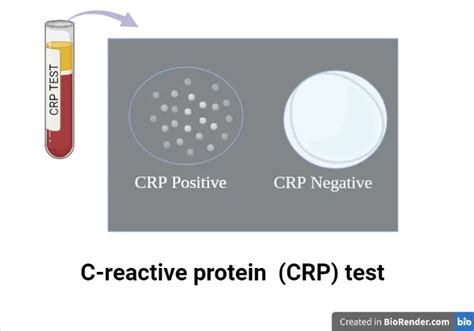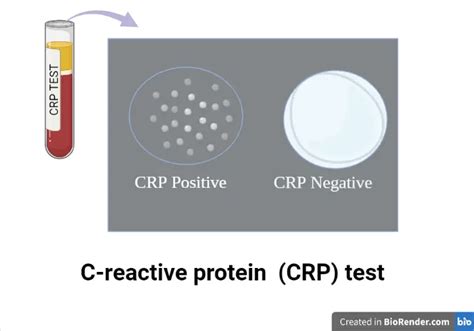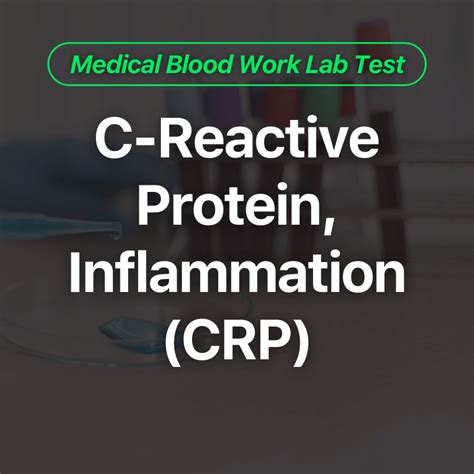Intro
The C-Reactive Protein (CRP) lab test is a widely used diagnostic tool that measures the levels of CRP in the blood. CRP is a protein produced by the liver in response to inflammation, infection, and tissue damage. Elevated CRP levels can indicate a range of health issues, from minor infections to chronic diseases. In this article, we will delve into the world of CRP lab tests, exploring their significance, working mechanisms, and practical applications.
The importance of CRP lab tests cannot be overstated. By measuring CRP levels, healthcare professionals can gain valuable insights into a patient's overall health and detect potential problems early on. This is particularly crucial for individuals with a history of cardiovascular disease, as elevated CRP levels have been linked to an increased risk of heart attacks, strokes, and other cardiovascular events. Furthermore, CRP lab tests can help monitor the effectiveness of treatments and track the progression of diseases.
The CRP lab test is a relatively simple and non-invasive procedure. A blood sample is drawn from the patient's vein, usually in the arm, and sent to a laboratory for analysis. The test measures the amount of CRP in the blood, which is typically reported in milligrams per liter (mg/L) or milligrams per deciliter (mg/dL). The results are then interpreted by a healthcare professional, taking into account the patient's medical history, symptoms, and other diagnostic tests.
What is CRP and How is it Measured?

CRP is an acute-phase protein that is produced by the liver in response to inflammation, infection, and tissue damage. The protein is composed of five identical subunits, each consisting of 206 amino acids. CRP is normally present in the blood at very low levels, but its production increases rapidly in response to inflammatory stimuli. The CRP lab test measures the amount of CRP in the blood using a technique called immunoturbidimetry or enzyme-linked immunosorbent assay (ELISA).
Types of CRP Tests
There are two main types of CRP tests: high-sensitivity CRP (hs-CRP) and standard CRP. The hs-CRP test is more sensitive and can detect lower levels of CRP, making it useful for monitoring cardiovascular risk and detecting early signs of inflammation. The standard CRP test, on the other hand, is more commonly used to diagnose and monitor acute infections and inflammatory conditions.What Do CRP Test Results Mean?

CRP test results are typically reported in mg/L or mg/dL. The normal range for CRP is usually less than 10 mg/L, but this can vary depending on the laboratory and the specific test used. Elevated CRP levels can indicate a range of health issues, including:
- Infections: Bacterial, viral, or fungal infections can cause elevated CRP levels.
- Inflammatory diseases: Conditions such as rheumatoid arthritis, lupus, and inflammatory bowel disease can cause chronic inflammation and elevated CRP levels.
- Cardiovascular disease: Elevated CRP levels have been linked to an increased risk of heart attacks, strokes, and other cardiovascular events.
- Cancer: Some types of cancer, such as lymphoma and lung cancer, can cause elevated CRP levels.
Interpreting CRP Test Results
Interpreting CRP test results requires careful consideration of the patient's medical history, symptoms, and other diagnostic tests. A healthcare professional will take into account the following factors when interpreting CRP test results:- The patient's medical history: A history of cardiovascular disease, inflammatory diseases, or cancer can affect the interpretation of CRP test results.
- The patient's symptoms: Symptoms such as fever, fatigue, and joint pain can indicate the presence of an underlying inflammatory or infectious condition.
- Other diagnostic tests: Other diagnostic tests, such as blood cultures, imaging studies, and biopsies, can help confirm or rule out underlying conditions.
Benefits and Limitations of CRP Lab Tests

CRP lab tests offer several benefits, including:
- Non-invasive and relatively simple procedure
- Quick results, often available within 24 hours
- Can detect early signs of inflammation and infection
- Can monitor the effectiveness of treatments and track the progression of diseases
However, CRP lab tests also have some limitations:
- Elevated CRP levels can be caused by a range of factors, making it difficult to pinpoint the underlying cause
- CRP levels can be affected by factors such as age, sex, and body mass index (BMI)
- The test is not specific for any particular disease or condition, making it necessary to interpret results in conjunction with other diagnostic tests and medical history.
Practical Applications of CRP Lab Tests
CRP lab tests have several practical applications, including:- Monitoring cardiovascular risk: Elevated CRP levels have been linked to an increased risk of heart attacks, strokes, and other cardiovascular events.
- Diagnosing and monitoring inflammatory diseases: CRP lab tests can help diagnose and monitor conditions such as rheumatoid arthritis, lupus, and inflammatory bowel disease.
- Detecting early signs of infection: CRP lab tests can detect early signs of infection, allowing for prompt treatment and reducing the risk of complications.
FAQs
What is the normal range for CRP levels?
+The normal range for CRP is usually less than 10 mg/L, but this can vary depending on the laboratory and the specific test used.
What can cause elevated CRP levels?
+Elevated CRP levels can be caused by a range of factors, including infections, inflammatory diseases, cardiovascular disease, and cancer.
How is CRP measured?
+CRP is measured using a technique called immunoturbidimetry or enzyme-linked immunosorbent assay (ELISA).
In conclusion, CRP lab tests are a valuable diagnostic tool that can provide insights into a patient's overall health and detect potential problems early on. By understanding the benefits and limitations of CRP lab tests, healthcare professionals can use this test to monitor cardiovascular risk, diagnose and monitor inflammatory diseases, and detect early signs of infection. If you have any questions or concerns about CRP lab tests, we encourage you to comment below or share this article with your friends and family. Remember, knowledge is power, and being informed about your health can help you make better decisions and take control of your well-being.
